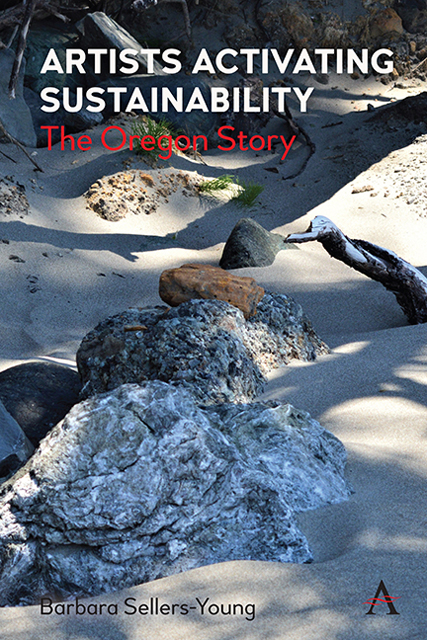Book contents
- Frontmatter
- Dedication
- Contents
- Acknowledgments
- List of Figures
- Introduction: Art, Environment and Metaphor
- 1 Environmental Activism, Arts and the Land of Eden Landscape One: High Desert Basin and Range
- Landscape One High Desert Basin and Range
- Landscape Two Columbia Gorge and Plateau
- Landscape Three Cascade Range
- Landscape Four The Willamette Valley
- Landscape Five Rogue River Valley
- Landscape Six Oregon Coast and Coast Range
- Index
14 - Climate Change, Sustainability and Artists in the Land of Eden
Published online by Cambridge University Press: 10 January 2023
- Frontmatter
- Dedication
- Contents
- Acknowledgments
- List of Figures
- Introduction: Art, Environment and Metaphor
- 1 Environmental Activism, Arts and the Land of Eden Landscape One: High Desert Basin and Range
- Landscape One High Desert Basin and Range
- Landscape Two Columbia Gorge and Plateau
- Landscape Three Cascade Range
- Landscape Four The Willamette Valley
- Landscape Five Rogue River Valley
- Landscape Six Oregon Coast and Coast Range
- Index
Summary
This we know: the earth does not belong to man; man belongs to the earth. All things are connected like the blood that unites us all. Man did not weave the web of life; he is merely a strand in it. Whatever he does to the web, he does to himself.
Chief SealthBefore Oregon was a territory or even a destination on the long trail, it was an idea. And the idea—an Eden where people prospected not for gold but for a better life— became the lifeblood that nurtured the Beaver State until the end of the 20th century.
Ed MadridKlamath Falls, Oregon-based environmental writer Emma Marris suggests there is a tendency for Oregonians to mythologize Oregon as having retained its nineteenth-century designation as the Land of Eden. She argues, “We must temper our romantic notion of untrammeled wilderness and find room next to it for the more nuanced notion of a global, half-wild rambunctious garden, tended by us.” As she notes, the romantic view does not take into account our impact on the planet. Ecologist Erle Ellis further describes our impact,
Seven billion people, Two billion more on the way. Intensifying agriculture. Accelerating urbanization. Increasing resource use per person. Atmosphere, climate, and oceans altered by industrial pollution. The ecology of an entire planet transformed by human action. This is the new normal. We live in the Anthropocene, a new period of Earth's history defined by human influences so profound and pervasive that they are written as a new global record in rock.
A corresponding view is held by visual artist Monte Shelton’s Key Element (Figure 23). Influenced by growing up visiting Oregon's diverse landscapes, during summer family adventures, Shelton comments on Oregon's current state through the iconic skeleton key, a symbol of opening. In this case, the opening is the influence of humans in the Anthropocene. Painted during the forest fires that swept Oregon in September of 2020, Shelton explains the painting's symbolism,
Initially, I chose to suspend the Key in the center and create a horizon with a purple violet sky. It was at this stage of the painting that the Willamette Valley was struck with multiple historic wildfires. The sky was an ominous red orange color that darkened the sky in the middle of the afternoon.
- Type
- Chapter
- Information
- Artists Activating SustainabilityThe Oregon Story, pp. 223 - 242Publisher: Anthem PressPrint publication year: 2022



